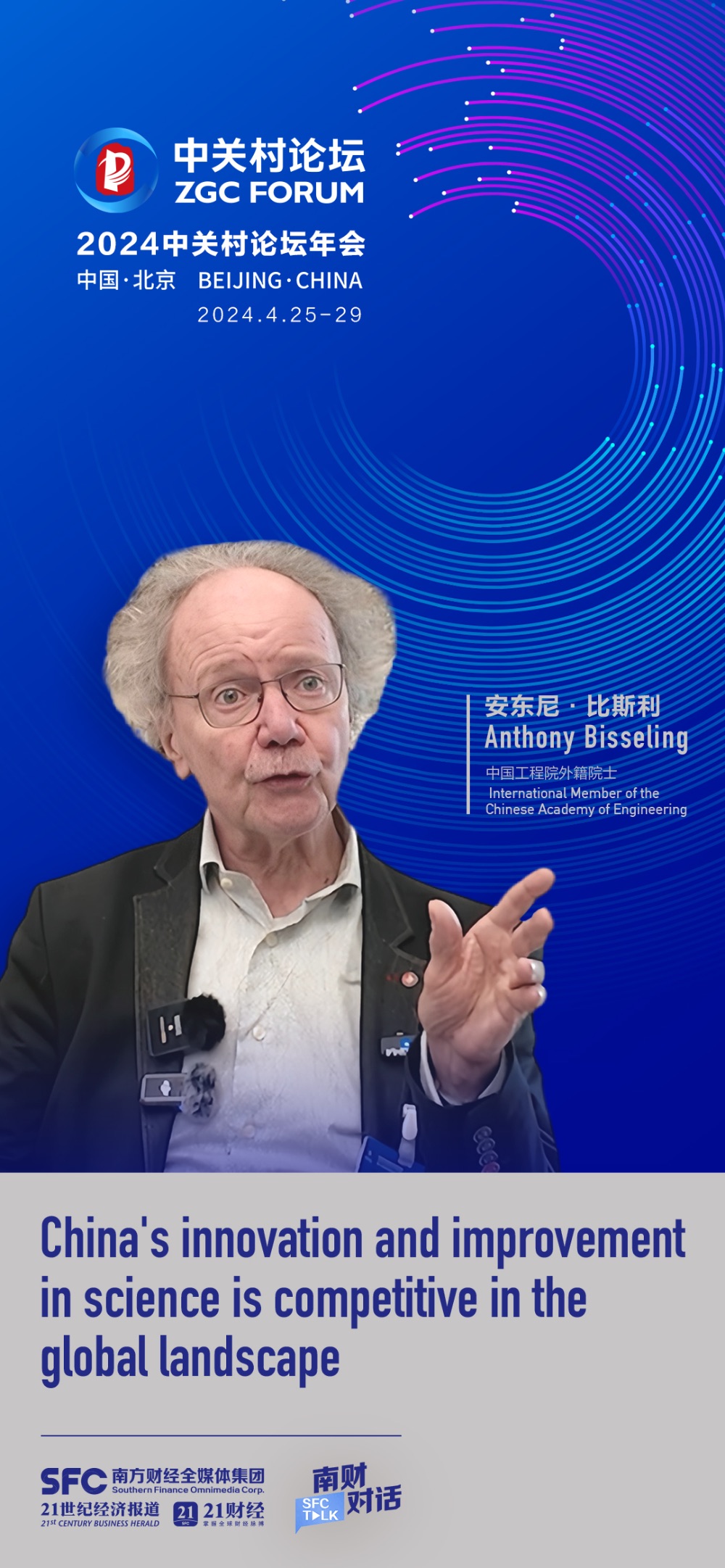南方财经全媒体记者 杨雨莱 杨清清 广州、北京报道
Anthony Bisseling, an international member of the Chinese Academy of Engineering, attended the Zhongguancun Forum 2024 which kicked off on April 25th. During the period, he shed light on Chinese innovation and achievement in science, especially in the agricultural field.
“There is an enormous increase in the publications that come from China in comparison with just 20 years ago.” Anthony was amazed by the progress made by Chinese scientists and researchers and he considered they are willing to collaborate and communicate in the exchange program which propels tremendous development.

SFC Talk: What has China achieved in training scientific talents and international scientific exchanges in recent years?
Anthony Bisseling: For example, by creating the CSC program, the Chinese Science Council program, by having exchange. I think if I look backwards now, the first person that came with the program in 1991, he is now the director of your best institute in plant science. There are several of the students that came are now full professor in institutes here. So I think the cooperation is very effective in training people that can take job. But on the other hand, it's also a fantastic platform for collaborations afterwards. It is fantastic to train people.
On one hand, train people that get used to a culture that is different, but also are very familiar with your own culture. To have collaborations and to create developments, such an exchange program is an example of me being in an academic world. I think this profitable for me. It's nice to interact. It's profitable for China, especially if they go back. And it's profitable for the collaborations afterwards.
SFC Talk: How do you evaluate the achievement China has made in recent years in terms of technological innovation,especially related to agriculture?
Anthony Bisseling: It is tremendous what has happened though. I see you have institutes like if I would say 20 years ago, the best institutes would have been unable to compete with an institute in the western part of the world. If I look at it now, this has markedly changed. It is also in part that it's a big country of China, so you can create facilities that you cannot create if you have a difficult technology. I see here companies that are specialized in this, which is an enormous market. If you would look at my country, my country is by inhabitants smaller than Beijing.So that's a very different issue to our facility.
So they are extremely competitive to just look at top journals like Science, Nature or whatever in this field. Then there is enormous increase in the publications that come from China in comparison with just 20 years ago. It is innovation. I think especially coming back to the exchange programs, the people that I see in my field that have reached the top ten often went abroad and have this combination, are able to collaborate. I respect it at both sides, and so that's tremendously good development.
SFC Talk: How can companies from different countries and regions learn from each other in terms of agricultural technology technologies?
Anthony Bisseling: I think maybe the first thing I would say is that you have to respect and evaluate the quality of your own things. We have changed the world. I'm from the Netherlands, and we are proud that we produce 80 kilograms of tomatoes on one square meter. That's something different from having very nice and tasty tomatoes. But the taste has gone up. But if you look at the greenhouses that came from the Netherlands, they are from a period in which energy was cheap.
Now energy becomes expensive, especially with us and then that really affects. It's something that I think you can also be proud of, it is your very classical greenhouses with a big thick wall and plastic stuff, no heating, but in whole heart Inner Mongolia in December, January, very nice strawberries without heating it, you could all say this is fantastic sustainability that you have. So don't give such things up, but keep the best of your own things and integrate this with, I can see that at least with the greenhouses, they adapt to the local situation, that I think is good. Don't underestimate your companies, but integrating and keeping the best, and not only thinking that things from abroad are the best, which is for sure, not always true.
SFC Talk: How do you think we can strengthen international technological cooperation to jointly address global challenges like famine?
Anthony Bisseling: I think if it comes to famine that means food production, that's important. And that is, I think, collaboration on doing this in a sustainable way, not only having high production, but sharing the methods by itself. It is also not wasting food which is also a good thing in China, but I think it is such a balance that you have. It is on one hand technology, it's also adapting to knowing that eating a lot of meat is also wasting a lot of food, that's also things to learn. So I think with continuous effort in breeding, but also not only to have the highest production, but to make things sustainable, I think it remains important. A country like ours, the Netherlands, and yours, they both are very much involved in trying to produce at least the food that you need, despite the fact that you are highly populated. And I think that requires (more) investment.
SFC Talk: Could you elaborate more on the biotechnology you mentioned in the meeting?
Anthony Bisseling: I will speak in a while about an example, which is I’m working on route nozzle symbiosis. It is nitrogen fixation. Your body will not exist without nitrogen. You have proteins, it's nitrogen. You have DNA, RNA, nitrogen. So everything that lives requires this, and you have fantastic symbiosis that do this. And you have man that can make, which costs a lot of energy, creates pollution. And so to see whether you can extend this to audible.
I can give you an example, if you go to neolithic periods, and see how agricultural development starts in China, what do they use? In addition to millet, they use soybean, protein-rich, and it can fertilize the soil for other plants. This is also true in the Middle East where you have lentils. It's also true in south America where you have beans. And so you see that people are smart and know that you need these crops. And so if you can transfer this to others, it saves energy, but it also means less pollution, and less pollution is an improvement in the world.
SFC Talk: What do you think of China's rapid development in the field of new energy in recent years and its significance to the world?
Anthony Bisseling: I think we have just heard talks about this. I listen to the people that have made major contributions in making these products and not only in making the products, but also making the products in such way that the price went down, and having the price go down, that means application on a wide scale. So in it this way, if you look at the solar cells, the other things related to wind, China has played the major role in the world in doing this. This is not just for China. On my house last year the solar cells are from China. So I think your contribution to this is very impressive.
SFC Talk: How do you view China's active participation in international innovation cooperation at present?
Anthony Bisseling: I think that is very important. I think for me, the collaborations are the most successful. If they are not only on a political level, but also on a personal level. I have a position in the University of Agriculture in Beijing. This is something I do, also because some full professors were PhD students from me. There is a very strong personal interaction between people. It's not just friendly, but the basis is it's completely independent of political discussion. And that means it's not my government that tells me I have to do this.
For me personally, this phase for me is very attractive to contribute to the development of your faculties and their research programs. And I enjoy this as much if it is in China, as if it is in the Netherlands. Because these are global problems that we work on and not Dutch problems or Chinese problems. So I think the collaboration is good and important. And I think to foster all these personal interactions makes it much more robust.
策划:于晓娜
监制:施诗
责任编辑:李依农
记者:杨清清
制作:蔡于恬
新媒体统筹:丁青云 曾婷芳 赖禧 曾昭发
海外运营监制: 黄燕淑
海外运营内容统筹: 黄子豪
海外运营编辑:庄欢 吴婉婕 龙李华 张伟韬
出品:南方财经全媒体集团

















